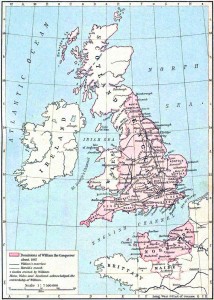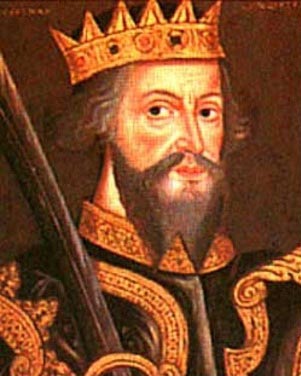William the Conqueror (c. 1028-1087), also referred to as William the Bastard, or William of Normandy, was the first English King of Norman origin. He reigned from 1066 to 1087. William was an illegitimate son of Duke Robert I and Arletta (Tanner’s daughter), probably the reason why his contemporaries decided to refer to him as “William the Bastard.” William became famous after he killed and defeated the very last Anglo-Saxon king of England during the Battle of Hastings.
Early Life
William the Conqueror was born in 1028 in Falaise, Normandy. It is believed that William’s mother was one of the members of the Ducal household. However, she never married Robert and instead became the wife of Herluin de Conteville. Robert I became Duke on August 6, 1027, after succeeding Richard III, his elder brother.
Rising to the Throne
Before his death, Robert had convened a council early in January 1035 where the assembled Norman magnates swore fealty to William as his successor. Robert died on his return journey to Normandy in July, 1035 at Nicea, after embarking on a pilgrimage to Jerusalem.
By the time his father died, William was only 7 years old, which was a major challenge for him in becoming the duke. Another complication was that he was an illegitimate son. Fortunately, he received support from King Henry I of France and Archbishop Robert (William’s great uncle). The support of these two prominent figures enabled William to inherit his father’s duchy.
Authority of Duke William continued to get more established as he matured. In 1047, he won a battle at Val-es-Dunes and became a master of Normandy. William married Matilda in 1053, and together they raised 4 sons and 4 daughters. Matilda was Baldwin V’s daughter (the Count of Flanders).
From 1047 henceforth, William succeeded in dealing with rebellion in Normandy that involved his kinsmen. He also dealt with external threats successfully, including the 1054 attempted invasion by King Henry I. William’s military experience, success, and political expertise enabled him to elevate the powers of the Duke of Normandy to a whole new level. In 1063, he finished the conquest of Maine, and in the following year, he was acknowledged as overlord of Brittany.
Conquest of England
 England’s King Edward died in early 1066 and was succeeded by Harold, who was the Earl of Wessex. Edward was William’s distant cousin. In 1051, Edward had promised William the throne and Harold swore to support that claim. So, when Harold was crowned as the new king, William became very furious.
England’s King Edward died in early 1066 and was succeeded by Harold, who was the Earl of Wessex. Edward was William’s distant cousin. In 1051, Edward had promised William the throne and Harold swore to support that claim. So, when Harold was crowned as the new king, William became very furious.
On September 28, 1066, William went to England and established a camp near Hastings. At that time, Harold was in the northern region where he was fighting king Hardrada of Norway, who had invaded England. Harold defeated Hardrada at Stamford Bridge and then marched quickly south. On October 14, 1066, Harold’s army met William’s and the two were involved in a close-fought battle that lasted all day. During the battle, Harold was hit by an arrow and died on the spot. In addition to that, his two brothers were also killed and the English army collapsed.
On December 25, 1066, William was crowned in Westminster Abbey. With his victory came many changes. Many members of the local English leaders were replaced with Normans. Other changes included a more strictly controlled system of feudal government and castle construction.
The feudal system of governing was unheard of in England before the conquest but was very prominent in northern France. King William and his followers managed to secure their position during the next four years, especially after 1069 Yorkshire rising. At Yorkshire, William destroyed a lot of crops, livestock and houses, making sure that the area remained deserted and indigent for many years. He took over large parts of land that was seized from Saxon rebels and the old royal estates. He kept about 1/4 of the earnings from the land to himself.
Governing England
 William spent his first years of reign in England destroying any resistance and establishing his borders. He maintained authority of Anglo-Saxon law and gave little legislation. The famous Laws of William were not assembled until the Twelfth century. He placed the local government resolutely under his command and made use of recognized land tax and broad commitment to military service.
William spent his first years of reign in England destroying any resistance and establishing his borders. He maintained authority of Anglo-Saxon law and gave little legislation. The famous Laws of William were not assembled until the Twelfth century. He placed the local government resolutely under his command and made use of recognized land tax and broad commitment to military service.
King William also exercised powers over the church. In 1070, he appointed Lanfranc (abbot of Saint Stephen’s Abbey) as the archbishop of Canterbury. Henceforth, Lanfranc became William’s agent and trusted adviser.
With William’s support, Lanfranc managed to promulgate many verdicts in a succession of councils that planned to bring the English Church in proportion to developments abroad. However, William persisted on his civil liberties to have authority over the church as well as its associations with the papacy. In fact, he would not allow a pope to be acknowledged and papal letters would not be given without his permission. In addition to that, he presided over the selection of prelates and did not allow bishops to excommunicate his tenants-in-chief or officials without his permission.
Domesday Book
One of William’s most noteworthy acts was the commissioning of the Domesday Survey on December 25, 1086 that catalogued England’s population. Primarily, the survey was carried out so as to record accountability to the land tax. The results of the survey were recapitulated in the 2 great volumes called the Domesday Book. Six months after this, William demanded for pledges of fealty from vast landowners regardless of whether they were tenants-in-chief or not. This way, he was affirming his rights not just as a feudal aristocrat over vassals, but as a king over his subjects.
Final Years and Death
After making sure that his kingdom was well settled, King William went to Normandy, where he spent his last 15 years. He left his regents, mostly clergymen, to run the government of England. He spent his last few months of reign fighting the French under leadership of King Philip I.
On September 9, 1087 at Siege of Mantes, William fell from his horse and died from injuries received. Prior to his death, King William had divided his land between his 2 sons, with William Rufus getting the land in England and Robert receiving the one in Normandy. Soon after his death, a war broke between his sons William and Robert over control of Normandy as well as England.
King William was treasured for his interest in reforming the church, his efforts to uphold order, and his fair judgment in political matters.
